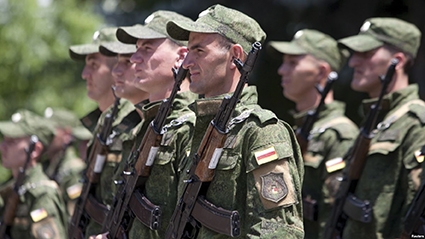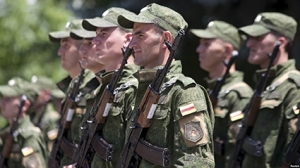Russia Ratifies Military Agreement with South Ossetia
On January 25, the State Duma, the lower chamber of the Russian legislative body, ratified the military agreement with breakaway Georgian region of South Ossetia “on the procedure of inclusion of separate units of the armed forces of the Republic of South Ossetia into the armed forces of the Russian Federation.”
The so-called parliament of Tskhinvali ratified the agreement on July 21, 2017. The agreement was presented for approval in the Duma by Russian Deputy Minister of Defense Nikolai Pankov and was signed on March 31, 2017.
The purpose of the agreement is to regulate the service of the residents of the breakaway Tskhinvali Region in the Russian military, especially the military base which Moscow has stationed in the region.
According to information shared by the Duma on January 18, it was made clear that “implementation of the agreement will allow the formation of a common defense space of the two states [Russia and South Ossetia], and inclusion of South Ossetian units into the system of training and application of forces of the Southern Military District.”
Russian Defense Minister Sergey Shoygu explained when the agreement was signed in March, that the agreement "will affect the further strengthening of security in the region and will undoubtedly serve as another factor to ensure that what happened in 2008 will not be repeated.”
The so-called Minister of Defense of South Ossetia, Ibrahim Gasseev, followed by expressing the great importance of the decision for South Ossetia. He said that when preparing the document to present to Russia, "a lot of productive work was done, and compromises were made on all important issues."
“South Ossetia counts on this agreement to further strengthen the defense and security of the state, and strengthen ties with the Russian Federation,” he added.
Tbilisi has repeatedly condemned the agreement, saying it is a “provocative step and unambiguous aggression” against the Georgia, and is deliberately destabilizing the uncertainty of the situation in the region.
The Chief of the General Staff, Colonel Viktor Fedorov, said that when the South Ossetian servicemen enter the Armed Forces of the Russian Federation, they will retain their titles and long service status.
He added that “the servicemen who go into the service of the 4th Russian military base or other units of the Russian army will receive a relatively high salary in comparison with our standards,” and “in addition, they will receive the full social package Russian military personnel have.”
He added on the same, that if there are no positions available at the 4th military base, then the South Ossetian service people can retain their employment in the Defense Ministry of South Ossetia.
“We will exclude a serviceman from the lists of the Armed Forces of the Republic after the order on his enrollment to the Russian base appears. If he does not suit the requirements, he will serve in the Armed Forces of the Republic,” he said.
According to Fedorov, the salaries of the military personnel of South Ossetia will increase after induction into the agreement.
It is also expected that the equipment used by the South Ossetian army will be upgraded to similar standards of the Russian military.
The Russian federation recognized the independence of South Ossetia and the second occupied region Abkhazia in the wake of the 2008 Russia-Georgia war. Since then, 20% of Georgian territories remain occupied by its northern neighbor.
In November 2016, the Russian State Duma ratified a similar military “agreement” with de facto Abkhazia.
In the case of war being declared, troops in South Ossetia would answer directly to the commander, appointed by the Russian Ministry of Defense.
Tom Day












